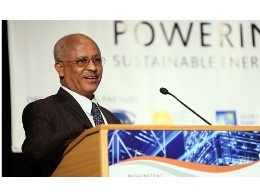Addis Ababa, 27 January 2015 (WIC) – Low Emission Low Carbon Transfer (LCET) Program that enhances and promotes Ultra-Low Head Micro Hydro Power (ULH-MHP) technologies for productive uses in Ethiopia was launched last Saturday at Adama Town.
Officially launching the pilot program that will be implemented at Fentale Wereda, Oromia Regional State, Alemayehu Tegenu Water, Irrigation and Energy (MoWIE) Minister said the emphasis on developing the nation’s renewable source of energy is one of the major targets of the country.
According to him, the overriding development agenda of the country is to sustain rapid and broad based economic progress. In this regard, significant results are being registered.
During the GTP II emphasis will be given to the utilization of improved technologies that speed up environmental friendly technological transformation, he said.
Alemayehu further noted that, using progressive and sustainable environmentally friendly technologies, the country aspires to register remarkable economic growth thus marching to make poverty history, the Minister added.
According to him, access to social services has increased and the level of poverty is diminishing from time to time. Besides expanding rural electrification, technologies like Ultra-Low Head Micro Hydro Power are significant to increase agricultural productivity, job creation and create value chain among different economic sectors.
Alemayehu also said in an effort to achieve economic progress the United Nations Industrial Development Organization, UNIDO, is contributing a lot to the industrial development of Ethiopia.
Speaking on his part, Kazuhiro Suzuki, Ambassador of Japan to Ethiopia stated that, Japan is working hard to improve the energy situation in Ethiopia through various schemes.
According to Suzuki, as part of its scheme Japan is providing support to Ethiopia in the field of climate change through formulation of plans related to water supply and resources, as well as through projects aimed to improve water supply, hygiene, and livelihoods in rural areas.
He also said that “Japan is working hard to improve the energy situation in Ethiopia. This will be accomplished in the future by joint efforts of both private and public sectors, including Small and Medium Enterprises (SMEs), so that Japan as a whole, can tackle various challenges associated with developing and implementing a new technology hand in hand with Ethiopia, for the sake of global environmental conservation.”
Suzuki said, Ethiopia is the first among African countries that signed a bilateral document with Japan on the Joint Crediting Mechanisms (JCM), which enhances the reduction of carbon emission.
The UNIDO Project in Fentale has been implemented to formulate specific projects under JCM, he said.
Acknowledging Ethiopian economic progress, Jean Bagambanya Bakole, UNIDO Representative and Director of Regional Office in Ethiopia said that UNIDO is glad to be associated with the process of Ethiopia’s transformation which is indeed an African home grown development success story.
Oromia Water Mineral and Energy Bureau Head Motuma Mekasa, said at the event that, in addition to increasing agricultural produces, when the project is implemented, it will open another window of hope to access modern and clean energy.
“This will definitely improve the life of the population. When scaled up, it will improve the life of millions who live far from the Grid,” Motuma said.
Enhancing local capacity and promoting ultra-low head micro hydro power technologies for productive uses in Ethiopia Project is a program funded by through the technical cooperation of UNIDO. (EH)




